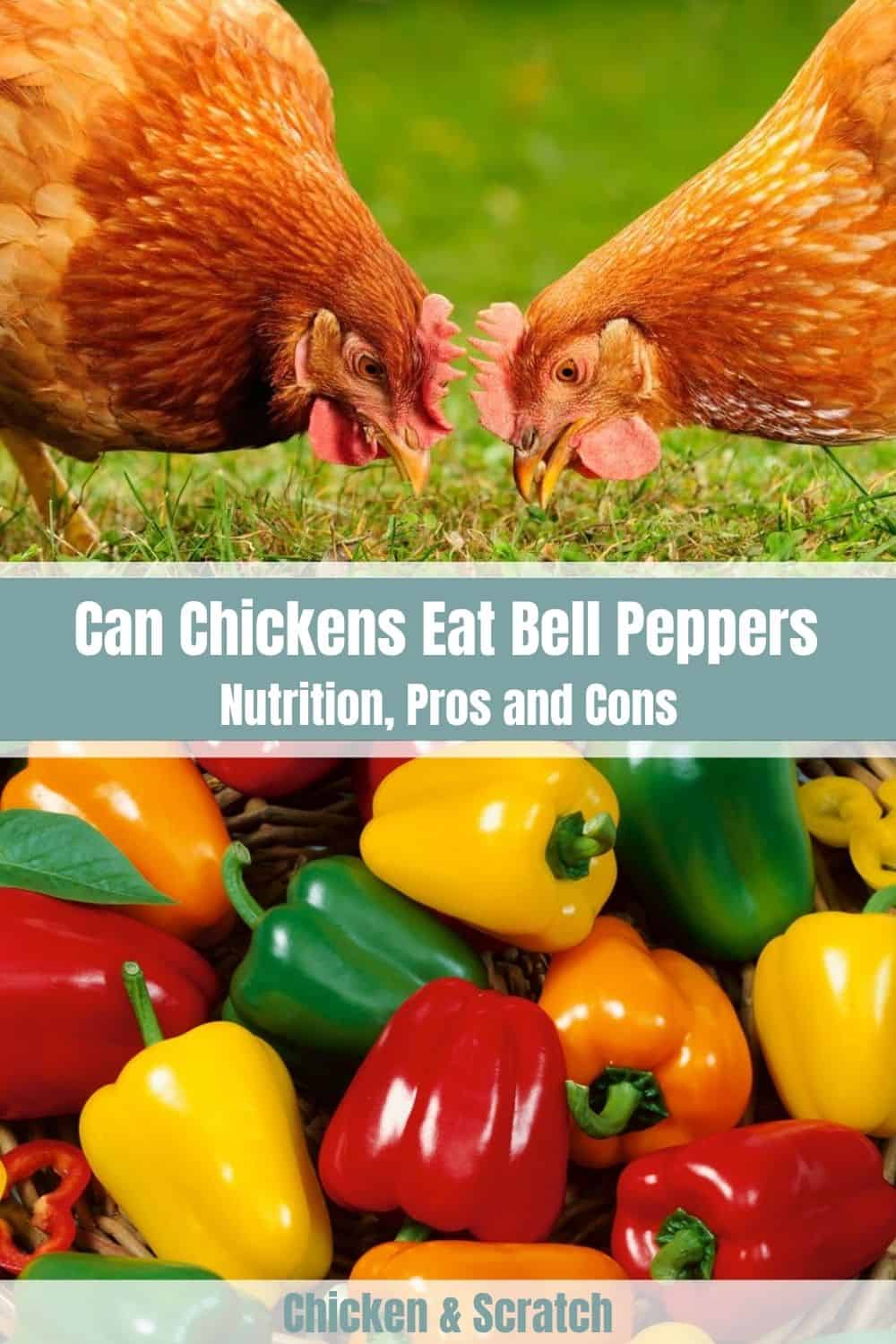If you’re wondering, “Can chickens eat bell pepper? They absolutely can. Hens love bell peppers. You just might be surprised that your flock devours all the pepper served. What’s more, bell peppers are very nutritious, pretty affordable, easy to source, and super easy to prepare.
Keep reading to learn more about bell peppers for chickens.
The Different Colors of Bell Peppers
Hens are omnivores and can eat a variety of fruits and vegetables, including green, yellow, and red bell peppers. You can give your flock bell peppers every day as long as they don’t get diarrhea. Alternatively, you can serve peppers from time to time as a snack or treat.
But while hens can eat as many bell peppers as they want, it’s important to know the number of calories your chickens will be taking overall to avoid obesity.
Also, bell peppers are an excellent source of vitamin C. But chickens can’t process too much of it, which can cause digestive upset and diarrhea. So remember that when feeding your chicken bell peppers.
Bell peppers basically come from the same plant. However, the color of pepper changes from green to yellow to red the longer it’s left to grow on the plant.
Green Peppers
Green peppers are peppers picked before they’re fully ripe. As a result, they feature a bitter, earthy profile and have fewer nutrients.
Yellow Peppers
Yellow peppers are at mid-ripeness and sweeter. They also contain more nutrients than green peppers. Yellow bell peppers can help make egg yolks darker.
Red Peppers
Red peppers require more time to mature. They are fully ripened and have a fruitier, sweeter flavor. Because they’ve spent the longest on the plant, red bell peppers are the most nutritious.
They also contain lycopene, an antioxidant that protects against aflatoxin B1. Moreover, red peppers contain beta-carotene and essential minerals such as iron, manganese, and calcium. If you feed red bell peppers to your flock, the carotenes in them will darken the yolks.
All in all, although red peppers pack a powerful punch, you can combine the various colors to add to the diet. Chickens generally love any color of pepper, but you may notice that some have a particular color preference.
Parts of the Bell Pepper that Chickens Can Eat
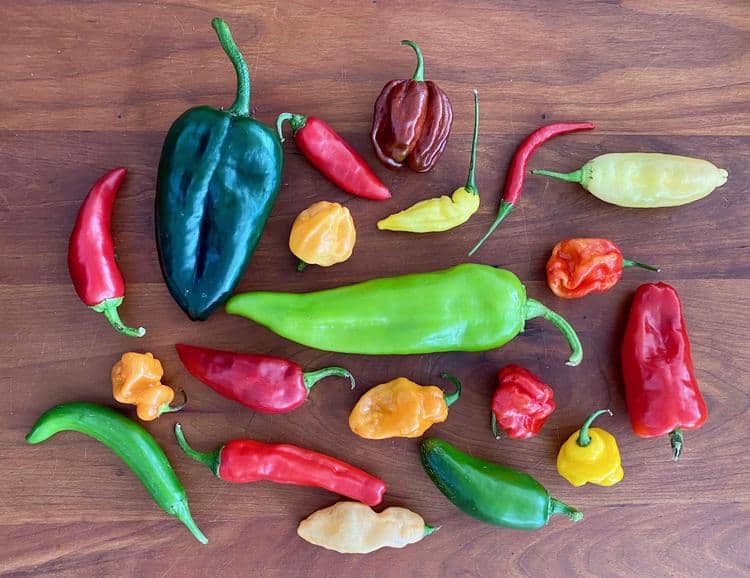
Bell peppers are generally safe, and your chickens can eat them. But there are exceptions when feeding your flock peppers. Bell peppers belong to the nightshade family.
The nightshade family contains a naturally occurring substance called solanine. Even though solanine helps fight pests and fungus, it’s a poisonous glycoalkaloid and is present in some parts of the pepper plant.
If hens ingest solanine, they can become sick. Solanine may cause the following health issues in your flock:
- Diarrhea
- Paralysis
- Convulsions
- Respiratory problems
- Neurological issues
- Death (when consumed in large quantities)
For this reason, you should remove the parts of the pepper plant that contain solanine before feeding your hens.
Your chickens can safely eat the following parts of the pepper plant:
Pepper Seeds
You don’t have to worry about the hassle of getting rid of all the seeds before offering peppers to chickens. Pepper seeds are very safe for your flock.
The seeds contain about 19 percent protein, so your chickens will enjoy a healthy, protein-rich snack when you feed them pepper seeds.
Pepper Fruit (Flesh) and Core
Pepper fruit and core are also perfectly safe. They contain many essential minerals and vitamins and can be fed to your hens.
On the other hand, you should never offer your chickens the following parts of the pepper plant:
Branches and Stems
The stems and branches are made of fiber. Chickens have little power to digest this kind of fiber, which can make them sick and slow their growth. Additionally, the branches and stems of pepper plants have solanine, which is toxic to birds.
Leaves
You should also steer clear of the leaves. The leaves of the pepper plant contain solanine and can be dangerous to your flock.
Flowers
Like the branches, stems, and leaves of pepper plants, flowers too have solanine and shouldn’t be fed to your birds.
Remember that bell peppers can go bad quickly without proper storage. Avoid feeding your flock rotting peppers, as they have fungi and bacteria that can harm them.
The Amazing Benefits of Bell Peppers
Chickens need a diet that will ensure they remain in optimal condition. The food they eat eventually affects their immune system, stress levels, and egg production.
Fortunately, bell peppers are nutrient-dense and extremely healthy for your birds. The high nutritional value of peppers makes them excellent snacks for dark orange egg yolks.
Bell peppers are loaded with important vitamins, antioxidants, and minerals that provide the following benefits:
Vitamin A
Vitamin A in bell peppers:
- Aids with bone development
- Boosts the immune systems of chickens
- Ensures your flock’s nostrils, throats, and eyelids remain moist
- Offers natural support for hens in stressful situations like during molting and cold weather
Vitamin B6
Vitamin B6 is useful in the following ways:
- Helps chickens absorb proteins
- Maintains normal hatching rates
- Improves yolk quality
- Promotes healthy feathers and bones
Vitamin C
Bell peppers contain high amounts of vitamin C, which does the following:
- Protects against cell damage
- Contributes to healthy feather growth and bones
- Enhances the immune system, particularly in cold weather
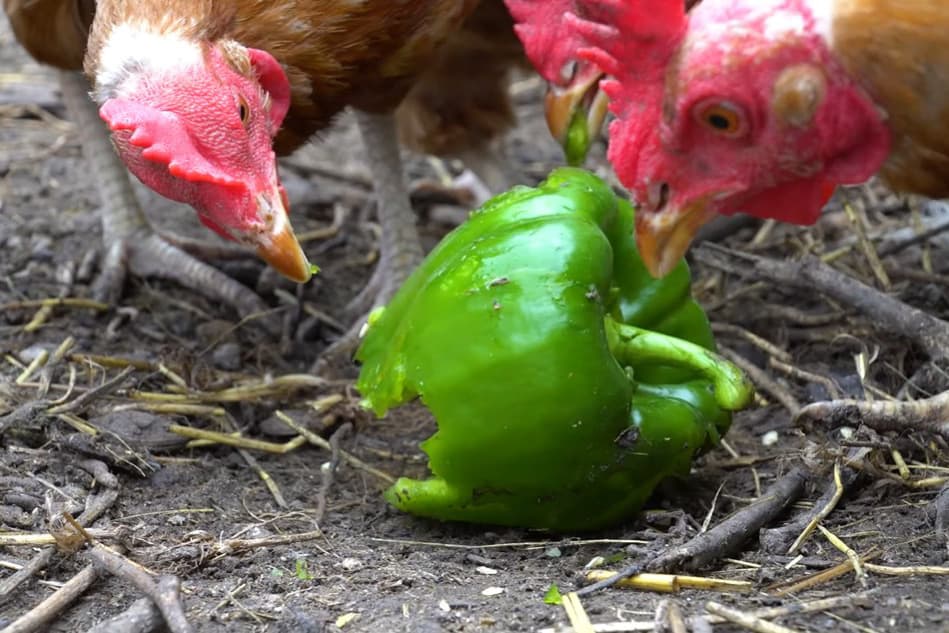
Vitamin E
Vitamin E is an antioxidant that boosts the immune system. It also suppresses free radical damage caused by stress and environmental toxins.
Additionally, vitamin E:
- Boosts egg quality
- Helps with shell density
- Encourages healthy cell growth
- Increases fertility in adult males
- Protects against diseases like bronchitis and coccidiosis
Vitamin K1
Vitamin K1 is the form of vitamin K found naturally in plants, including bell peppers.
Vitamin K in chickens:
- Regulates blood clotting
- Maintains bone health
- Boosts egg-laying rates
- Improves bone flexibility and structure
Potassium
Potassium is essential for:
- Muscle development
- Healthy heart function
- Eggshell thickness
Calcium
If your hens aren’t laying eggs or laying few eggs, they’ll require more calcium for their bones. You can fix that by adding red bell peppers to your chicken’s diet to ensure they get the necessary calcium.
Peppers also have a high water content – they contain about 92 percent water. Because of the high water content, your hens will stay hydrated throughout the day.
At the same time, bell peppers are low in calories and fats, which helps promote your flock’s overall health.
Things to Consider When Feeding Peppers to Chickens
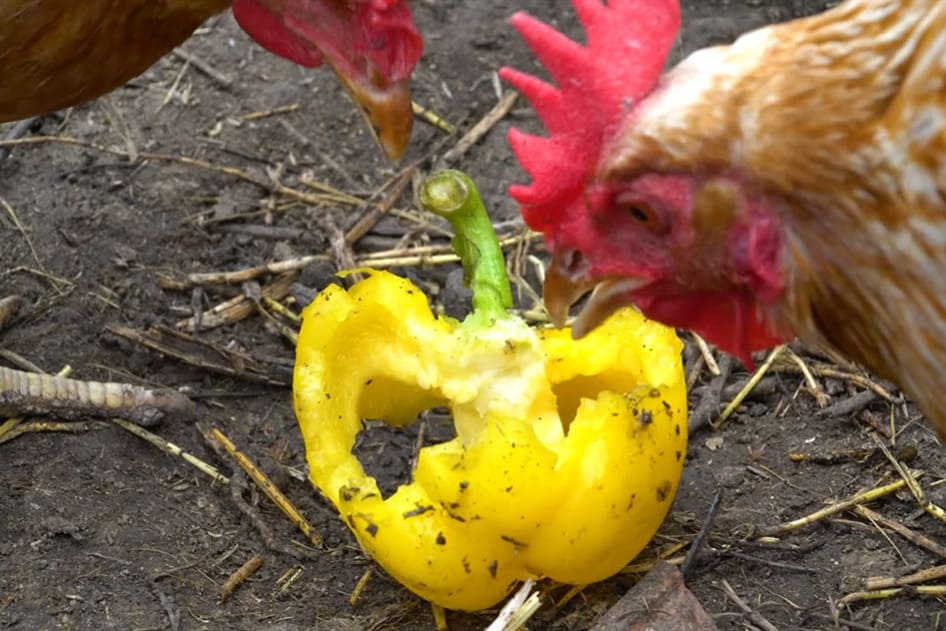
When feeding your hens peppers, you should consider the following:
Select the Right Bell Peppers
All bell peppers are not the same. Although a wide variety of peppers can be fed to your flock, avoid moldy peppers or peppers sprayed with herbicides, pesticides, and other chemicals like lawn treatment products.
Prepare the Bell Peppers
They are different ways you can feed your chicken bell peppers. But first, you must remove any leaves, stems, branches, and flowers, as these can be pretty harmful to your flock.
Next, you can prepare the bell peppers in the following ways:
- Feed whole peppers to your chickens.
- Slice the bell peppers into strips and hang them low on the coop roof where your hens can peck and eat them.
- Cut the peppers into small bite-sized pieces. This will make it easier for the chickens to eat and prevent choking hazards.
- If you have many bell peppers, simply chop them into tiny pieces and scatter them over the chicken feed.
Hens are not fussy, so regardless of how you serve bell peppers, you can be sure they’ll enjoy snacking on them.
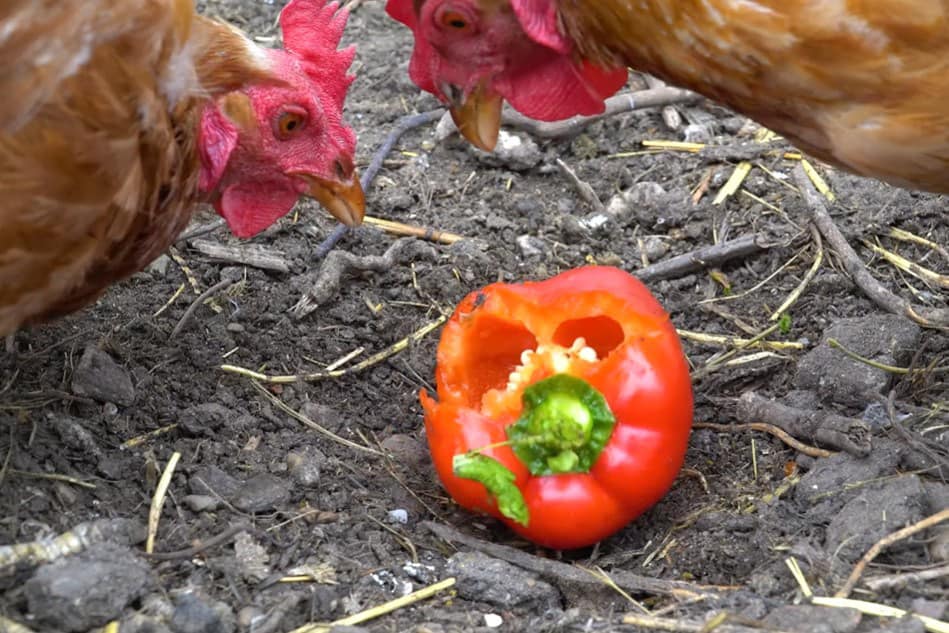
Closely Watch Your Hens
Whenever you feed your flock new food, it’s crucial to closely watch them for signs of problems. For instance, there’s the possibility of digestive issues or an allergic reaction. If you see any reaction, stop feeding them and call your vet if their condition worsens.
Can Baby Hens Eat Bell Pepper?
You shouldn’t feed your chicks any peppers. At their tender age, their digestive system is still developing, which makes it hard for them to digest bell peppers.
Rather, your baby chickens need starter feed to get them off to a strong start in life. Starter feed is usually available in most farm supply stores and sold in different varieties: mash, pellets, and crumbles.
Starter feeds are specially formulated to offer a balanced diet that includes vitamins, proteins, minerals, carbohydrates, and fats. All these are essential nutrients that ensure baby chicks grow and develop into robust cocks or excellent egg layers.
At about three weeks old, you can begin to slowly introduce peppers to your baby chicks. Give them small pieces and see if they’ll eat. Also, ensure you offer them grit. By providing grit, you can be sure that they’ll be able to fully grind up and digest the bell peppers.
Bottom Line
So can chickens eat bell peppers? The answer is yes. You can feed your flock peppers as often as you want, either as treats or snacks. However, don’t give them the leaves, flowers, stems, and branches of peppers plants. You can also try mixing the different colored peppers and see which ones are your chicken’s favorite.

Joseph Hudson has been raising chickens for over 15 years. In 2018, he completed the Agriculture & Natural Resources program at Mt. San Antonio College. He currently raises over 1400 chickens on his 7.5-hectare farm. He keeps sharing his experience on raising healthy and happy chickens on Chicken Scratch The Foundry.
